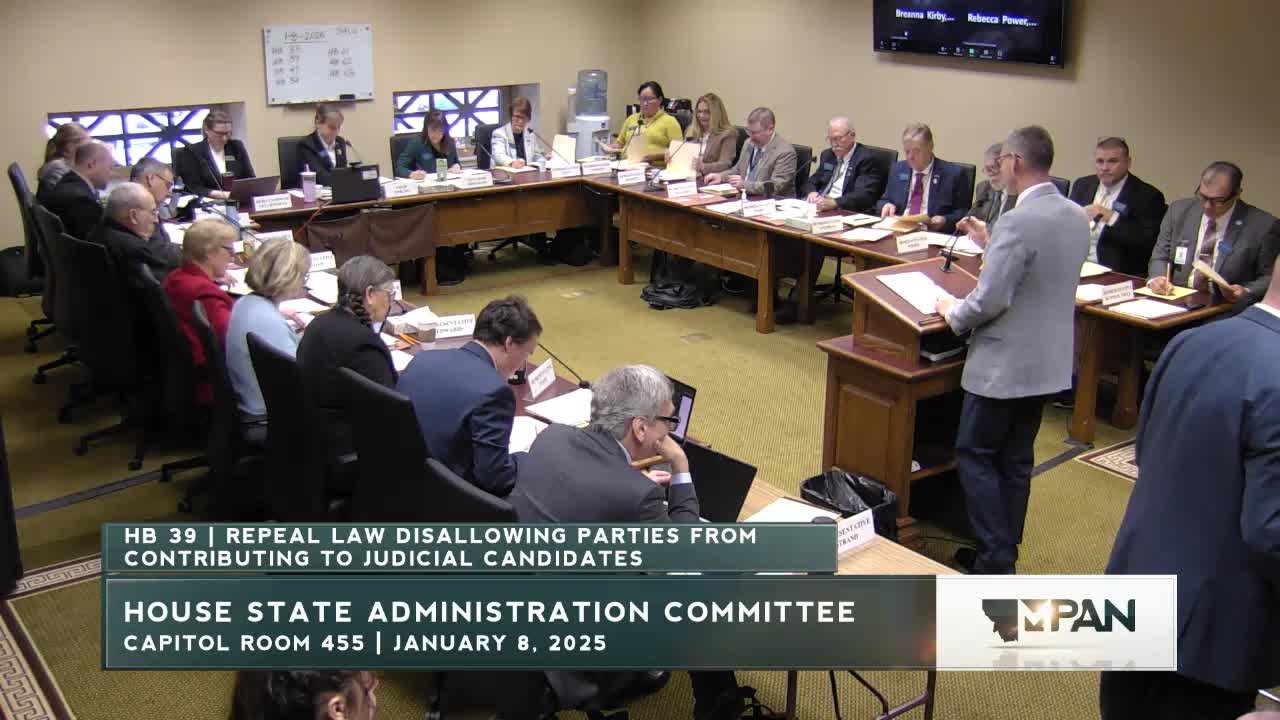Contested bill would let Montana political parties contribute to judicial campaigns; tribes and State Bar oppose
Get AI-powered insights, summaries, and transcripts
Subscribe
Summary
Representative Tom Millett presented House Bill 39 to repeal the statutory ban on political‑party contributions to judicial candidates, saying party support would make judicial elections more transparent and competitive.
Representative Tom Millett introduced House Bill 39, which would repeal a statutory prohibition on political parties contributing to judicial candidates. "This bill repeals MCA 13‑35‑231," Millett said in opening remarks, explaining the sponsor's view that allowing party contributions would increase transparency and help candidates run competitive campaigns.
Senator Barry Usher, a vice chair of the Senate special select committee on judicial oversight and accountability, testified in support and said parties already influence judicial races through third‑party political action committees. "This is more about being transparent instead of hiding money in some third party," Usher said, and asked the committee to advance the bill so the full House and Senate could debate related reforms.
Opponents testified at length. Patrick Yawaki, representing the Blackfeet Tribe and Rocky Boy Tribe, urged a no vote, calling the measure "a direct attack on the sanctity of the judicial branch" and warning of out‑of‑state money influencing Montana races. Alyssa Snow (Fort Belknap Tribes) said injecting politics threatens work on sentencing disparities and incarceration in Native communities. Bruce Spencer, representing the State Bar of Montana, said the current restriction was a constitutionally permissible limit designed to keep judges free from the appearance of partisan influence. "If you allow political parties to contribute to judges, you automatically and necessarily tag that judge with a political label," Spencer said, arguing the bill would harm public confidence in judicial impartiality.
Remote witness Evan Barrett, a retired constitutional historian who said he had served in political party leadership, testified against the bill and framed it as part of a broader push toward partisan judicial elections in Montana.
Committee members questioned proponents and opponents about money and perception. Representative Byrne asked whether past contributions by future judges to parties necessarily created partisan judges; Bruce Spencer said sitting judges are bound by canons of judicial conduct and typically stop partisan activity upon taking the bench. Senator Usher argued that core beliefs do not disappear when a candidate becomes a judge but maintained that party support provides voter information and campaign assistance. Representative Bertolio asked about reducing outside money; Spencer said the State Bar supports limiting money in judicial elections but noted U.S. Supreme Court precedent constrains states on independent‑expenditure bans.
No committee vote is recorded in the hearing transcript. The sponsor asked the committee to advance the bill so the House and Senate could continue debate.
Next steps: HB 39 will be returned to committee for executive action if the committee so votes; the hearing record shows significant organized opposition from tribal governments and legal organizations.
